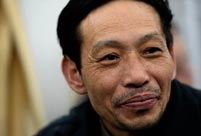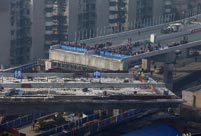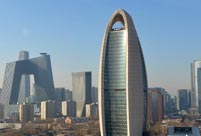 Int'l Snow Sculpture Art Expo in Harbin
Int'l Snow Sculpture Art Expo in Harbin Sichuan money wall for dividend payment
Sichuan money wall for dividend payment Li Na crashes Belinda Bencic in 2nd round at Australian Open
Li Na crashes Belinda Bencic in 2nd round at Australian Open
 Shocking moments when PLA's weapons open fire
Shocking moments when PLA's weapons open fire Famous Lanzhou beef noodles
Famous Lanzhou beef noodles Armed Police hold anti-terrorism drill in SE China's Xiamen
Armed Police hold anti-terrorism drill in SE China's Xiamen Harbin Int'l Ice and Snow Festival opens
Harbin Int'l Ice and Snow Festival opens 'Jin' named the word of the year by cross-strait netizens
'Jin' named the word of the year by cross-strait netizens Chinese scientific expedition goes to build new Antarctica station
Chinese scientific expedition goes to build new Antarctica station
FUZHOU, Jan. 26 -- Migrant worker Zhang Desheng was under no illusions about the ordeal of a nonstop 12-hour motorbike ride in winter, but the excitement of homecoming for the Lunar New Year made it one he was willing to face.
"I was so excited that I couldn't get to sleep until 2:30 this morning. I'm dying to see my wife and son," Zhang told Xinhua shortly before hitting the road a week ahead of the holiday, or the Spring Festival, that falls on Jan. 31.
His rural hometown in east China's Jiangxi Province is more than 700 km from Fuzhou, capital city of the neighboring Fujian Province, where he is a construction worker.
With intense competition for train tickets, saddling up proves to be a good option for many. Jiangxi-Fujian highways have become such well-traveled routes for homebound motorcyclists like Zhang that the Fujian branch of PetroChina, a state-run oil and gas giant, has for three years offered free gas to migrant workers at designated filling stations during the holiday rush. This time around, it has reported a rise of around 350 percent in take-up of the deal.
Most of the country's over 260 million migrant workers would move heaven and earth to return home before the Spring Festival, which commonly denotes a once-a-year chance for them to reunite with family.
This year, the 40-day Spring Festival travel rush, the world's largest seasonal migration of people, will see 3.6 billion passenger trips, nearly 260 million of them by train, according to a government forecast.
Despite the turbo-charged development of China's railways, their capacity is still dwarfed by demand, as trains remain the first choice for long-distance journeys.
Zhang failed to gain one of the golden train tickets. However, he didn't let the train's inaccessibility get him down. He instead prepared for a motorbike journey that is becoming wearingly familiar after identical experiences in recent years.
So over the past few days, he has busied himself securing a mountain of belongings to the bike's pillion. Among them are gifts (new clothes and shoes for his wife, literary classics for his son) and "usable articles" he has sifted from trash at his place of work. One such item, a red plastic stool poked out of a bulging bag.
Zhang was expecting the trip to be less tedious this year, as he joined a group of migrant workers riding from Fuzhou to their hometowns in different parts of Jiangxi.
Amid high spirits, the motley band of two-wheelers were cautious about the long, arduous and dangerous trek.
Wrapping up in a cotton-padded jacket, a waterproof coat and a pair of leather knee pads, Xiao Xianfu used tape to swathe his shoes in two layers of Styrofoam.
"In my experience, that works well. The feet are the most vulnerable part to the cold during a motorbike ride," Xiao said.
Another veteran rider, Huang Yugen, planned to spend the night at a rest stop even though nonstop travel would get him home sooner. "Safety is the most important thing during the holiday," he believes.
Striking a chord with many Chinese who value strong family bonds, the perseverance of migrants in getting home has prompted the government and companies to help.
The Fujian branch of PetroChina asks people to register in advance before taking advantage of the seasonal free gas. In addition, the company has also provided each registered rider with free meals, a map, a traffic safety vest and accident insurance.
Nearly 400 migrant workers asked for the help in 2012, while the number surged to some 1,400 this year, according to Chen Shangyuan, a PetroChina employee in charge of the program.
Since Jan. 16, when the Spring Festival travel rush kicked off, traffic police in Guangdong, Guangxi, Hunan and Guizhou regions have jointly run services including escorts and warnings on road conditions for homebound motorcyclists.
"I'm very happy to help, but just can't stop worrying about their safety. Hopefully next year they can make it home in a safer way," Chen said.
 A 60-hour journey home
A 60-hour journey home Int'l Snow Sculpture Art Expo
Int'l Snow Sculpture Art Expo Highlights of China's air force
Highlights of China's air force Airline crew stage flashmob dance at Kunming airport
Airline crew stage flashmob dance at Kunming airport Top15 countries to retire to in 2014
Top15 countries to retire to in 2014 Hot supermodel's new photo album released
Hot supermodel's new photo album released Asia's heaviest box girder finishes 'rotation' in Wuhan
Asia's heaviest box girder finishes 'rotation' in Wuhan Completed facade of People's Daily new headquarters
Completed facade of People's Daily new headquarters Chinese-branded car passes North America standard safety test for the first time
Chinese-branded car passes North America standard safety test for the first time Li Na beats Bouchard to reach Australian final
Li Na beats Bouchard to reach Australian final  Explore the sources of PM 2.5
Explore the sources of PM 2.5 Highlights of Chinese airborne troops'exercises
Highlights of Chinese airborne troops'exercises  'Living in ice house' competition held in central China
'Living in ice house' competition held in central China  Chinese figure in Oscar nominations
Chinese figure in Oscar nominations  Top ten aerospace events in China 2013
Top ten aerospace events in China 2013Day|Week|Month